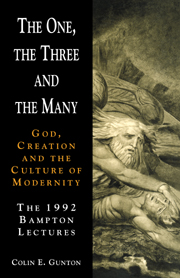Book contents
- Frontmatter
- Contents
- Preface
- Introduction
- PART ONE THE DISPLACEMENT OF GOD
- 1 From Heraclitus to Havel. The problem of the one and the many in modern life and thought
- 2 The disappearing other. The problem of the particular in modern life and thought
- 3 A plea for the present. The problem of relatedness in modern life and thought
- 4 The rootless will. The problem of meaning and truth in modern life and thought
- PART TWO RETHINKING CREATEDNESS
- Bibliography
- Index
3 - A plea for the present. The problem of relatedness in modern life and thought
Published online by Cambridge University Press: 05 June 2012
- Frontmatter
- Contents
- Preface
- Introduction
- PART ONE THE DISPLACEMENT OF GOD
- 1 From Heraclitus to Havel. The problem of the one and the many in modern life and thought
- 2 The disappearing other. The problem of the particular in modern life and thought
- 3 A plea for the present. The problem of relatedness in modern life and thought
- 4 The rootless will. The problem of meaning and truth in modern life and thought
- PART TWO RETHINKING CREATEDNESS
- Bibliography
- Index
Summary
MODERNITY'S THIS-WORLDLINESS
In the second chapter, discussion centred on the modern treatment of particulars: what makes things and people particularly and distinctively what they are. I argued that modernism and postmodernism alike work for the destruction of particularity and for homogeneity, the former in subordinating the particular to rigid and universal patterns of thought and behaviour, the latter failing to make any links between things at all, and so treating everything as of equal value. At the centre once again was the theme of displacement. God is displaced from the centre of things, and just as in the first chapter he was seen to be displaced into impersonal forces, so here he is displaced into human subjectivity, with the consequent loss of coordinates charted by Václav Havel. Not God but the human will becomes the creator of value. In this third chapter we move from the problem of particularity to the corresponding question of how particular things and persons are understood to be related to one another. It will be similar in form to the second chapter, moving from an indication of some symptoms, through a brief account of some ancient and modern sources of the malaise, to two related theological analyses of the underlying problems.
One way of speaking of the modern condition is to say that, in reaction to the supposed other-worldliness of pre-modern, and especially mediaeval, culture, the modern world has affirmed in a unique and far-reaching way the priority for both being and life of time over eternity, space over infinity.
- Type
- Chapter
- Information
- The One, the Three and the Many , pp. 74 - 100Publisher: Cambridge University PressPrint publication year: 1993



